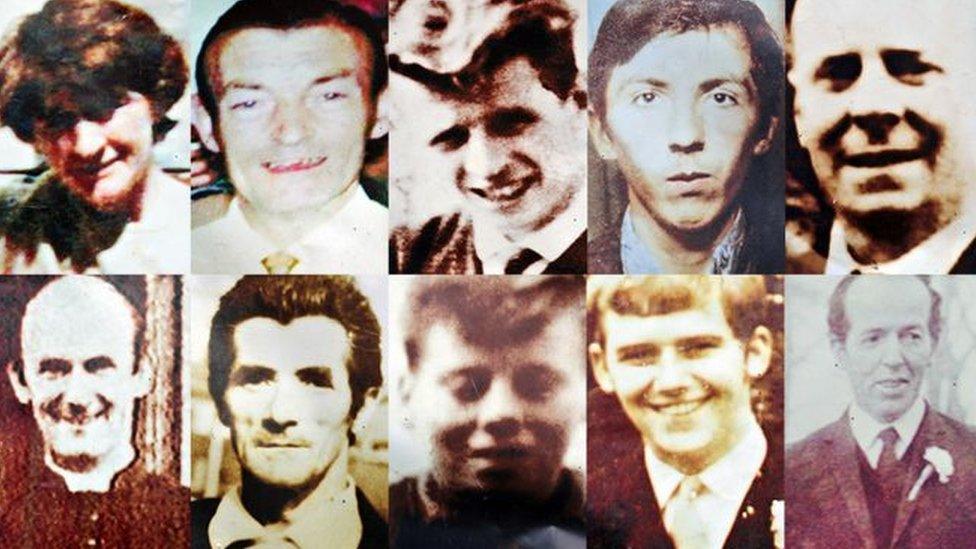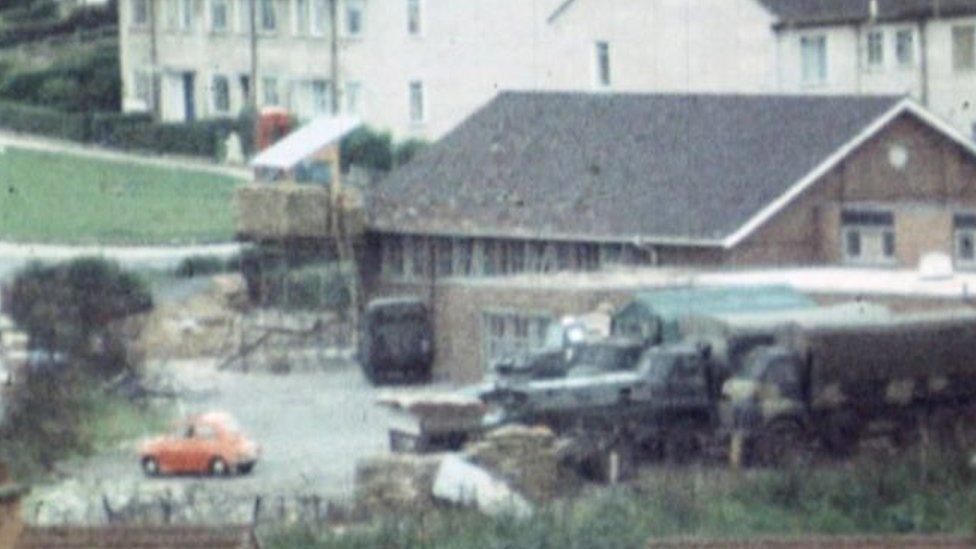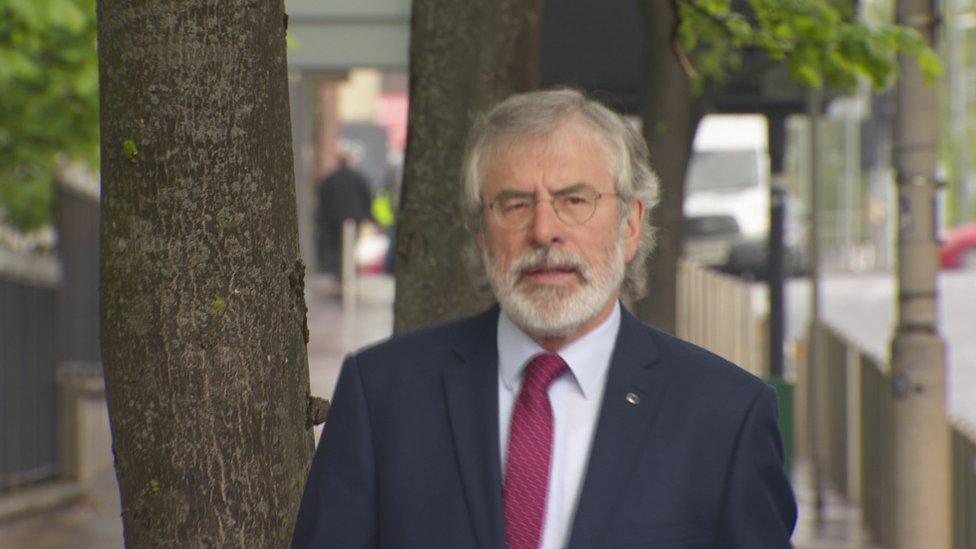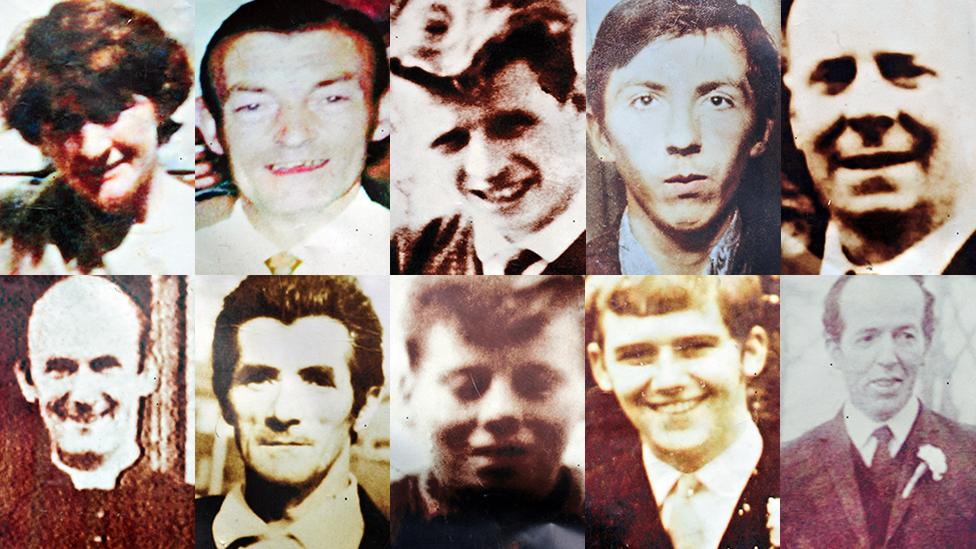Ballymurphy: Former paratrooper says soldiers 'were out of control'
- Published

An inquest is examining the deaths of 10 people killed in shootings at Ballymurphy in August 1971
A former paratrooper has broken down in tears at an inquest into the deaths of 10 people in west Belfast, saying that "rogue soldiers" were "out of control" and "shot innocent people".
The inquest is looking into shootings in August 1971, amid disturbances in Ballymurphy sparked by the introduction of internment without trial.
Relatives of the 10 people fatally shot insist that none of them was armed or involved in any terrorist activity.
Soldier M597 was a member of A Company.
He said he was in the Henry Taggart Army base shortly after an incident in which four people were fatally shot.
The base was occupied by B Company but M597 said he knew many of the soldiers from their training in Aldershot in England.
A Company is a military unit consisting of scores of soldiers.
M597 told Belfast Coroners' Court on Monday that many of the paratroopers he knew were honest, professional soldiers who did the right thing.
But he added that some were "psychopaths" who were dangerous to be around.
He wept briefly as he described seeing three or four bodies in the hall and recalled what the soldiers there told him had happened.
He said the soldiers were on a high, excited, and had clearly enjoyed what they had done.
He said they told him that B Company officers had lost control and that the Army would give them cover for whatever they had done.
M597 said they felt they could "shoot anything that gets in the way".

Soldiers from the Parachute Regiment were based at Henry Taggart Army base
He said the soldiers made a joke about the bodies and seemed to show no respect for those they had killed.
"It was a joke to them," he told the court.
Those killed in Ballymurphy included a mother of eight and a priest.
M597 also said the B Company soldiers had told him that, in their view, "any man or woman walking the street was in the IRA or associated with the IRA and for that reason alone could or would be shot".
He said the soldiers he met "revelled in what happened".
Last week, the inquest heard claims that paratroopers had used a man's skull as an ashtray and that soldiers held a sweepstake on who would kill a gunman first.
They had featured in the book Killing Zone, written by a former fellow soldier, the barrister Henry Gow.
As he was about to leave the court, M597 told the families of the Ballymurphy victims that the claims were false.
"I am truly sorry for any part I played in this and I would like you to leave here not believing what [Henry] Gow told you last week, because it's not true," he said.
"I'd hate for you guys to go through the rest of your life thinking that - it's just not true."
M597 had earlier described being handed the book while working in the Middle East, reading it and saying to himself: "This is absolute garbage."
'Pat on the back'
Earlier on Monday, he explained that on 9 August 1971, he had shot and wounded a petrol bomber on the Falls Road in west Belfast and had accompanied him to hospital.
He said the incident was not properly investigated, but that the battalion adjutant had called him into his office some days later and given him "literally a pat on the back".
He said the officer had told him "the only mistake you made was not killing the..." and said that the officer then swore.
M597 said he had no memory of making a proper statement.
He said that many months later in court he agreed to drop the charge of petrol bombing against the man because he had nothing against him.
He also described a separate occasion when he was given photographs of shooting victims by a medic or doctor but refused to keep them.
He said he thought: "God, these are real people from here."
Of those weeks in 1971 he said: "It was sheer bravado - rogue soldiers were out of control, killing people in the street and knowing they would be protected."
'Like the Ku Klux Klan'
He also rejected the suggestion from a Ministry of Defence barrister that he had not been at the Henry Taggart base at all, because he could not identify the name of anyone who had discussed the shootings with him.
Asked why he had not raised what he had heard at the time, he said the Parachute Regiment was not much different now to 50 years ago.
"It's like the Ku Klux Klan, like a brotherhood - they are sticking together."
He later added: "It wasn't an organisation where you go to an officer and say that kind of thing.
"You would've been in real, deep trouble."
M597 said he was shocked by what he had found about the Parachute Regiment on social media.
He told the court it was not right that instructions had been posted online urging former soldiers not to cooperate with the inquest - instructions such as "dementia, delay, death".
He added that he did not "want any part of that".
'Denied witnessing abuse'
Earlier on Monday, a former Royal Military policeman told the court he had been at the Henry Taggart base a day after the deaths and had heard stories from the soldiers there about what had happened.
Soldier M928 said that soldiers told him about the shooting of the priest Father Hugh Mullan and heard the rumour that he had been moving a weapon or weapons at the time.
Fr Mullan was shot near Springfield Park, some distance away from the base.
The soldier was asked why he had told investigators three years ago that he had witnessed that incident.
M928 said he had mixed two separate incidents up in his head and when he realised his mistake he had corrected it at the time.
He also denied witnessing the abuse of prisoners at Girdwood Barracks in north Belfast where he often delivered prisoners arrested by the Army.
- Published10 May 2019

- Published9 May 2019

- Published8 May 2019

- Published7 May 2019

- Published11 May 2021
